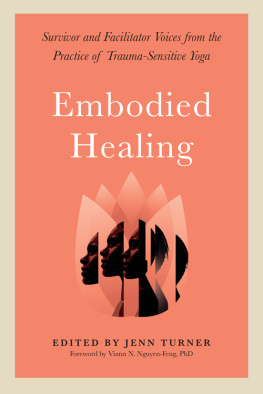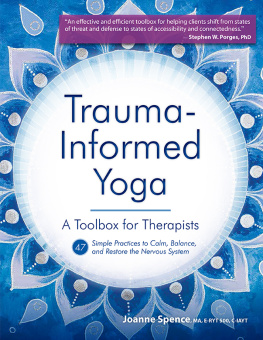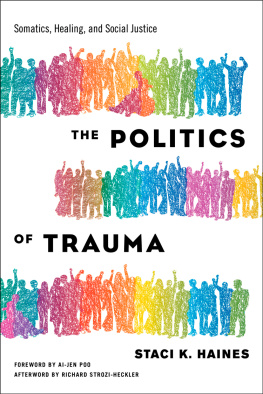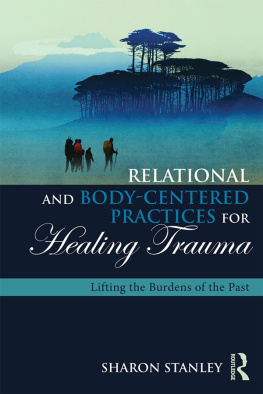PRAISE FOR LIFTING HEAVY THINGS
An empowering guide for anyone who wants to experience exercise as an act of self-care, an exploration of strengths, and a practice of self-trust. More than just an introduction to lifting weights, this book shares a new way of relating to your body.
Kelly McGonigal, author of The Joy of Movement
A unique and beautiful book on working with trauma and healing in an embodied way. This advice is both deep and practical, and can be used by anyone interested in a stereotype-breaking story about trauma and how we might heal from it.
Ethan Nichtern, author of The Road Home: A Contemporary Exploration of the Buddhist Path
Lifting Heavy Things takes an innovative and timely approach to addressing trauma. This powerful, embodied practice, combined with a gentle and compassionate emotional perspective, is brilliant. This is a book I will use in my practice with clients working to heal trauma.
Haven Fyfe Kiernan, LICSW, psychotherapist and trauma specialist
I wouldnt be surprised to see a new movement revolution sparked by Lauras genre-bending book. Lifting Heavy Things has raised the bar by revealing how movement can be the satisfying basis of healing trauma.
Dan Cayer, Alexander Technique teacher and contributor to The In-Between newsletter

Copyright 2021 by Laura Khoudari
Foreword copyright 2021 by Licia Sky
All rights reserved. No part of this book may be reproduced, stored in a retrieval system or transmitted, in any form or by any means, without the prior written consent of the publisher or a license from The Canadian Copyright Licensing Agency (Access Copyright). For a copyright license, visit www.accesscopyright.ca or call toll free to 1-800-893-5777.
Cataloguing data available from Library and Archives Canada
ISBN 978-1-928055-77-8 (paperback)
ISBN 978-1-928055-78-5 (EPUB)
ISBN 978-1-928055-79-2 (EPDF)
Editor: Jennifer Kurdyla
Copy editor: Sydney Radclyffe
Cover design and interior design: Morgan Krehbiel
Cover image: iStock.com/vav63
Author photo: Viviana Podhaiski

Published by LifeTree Media, an imprint of Wonderwell
www.wonderwell.press

Distributed in the US by Publishers Group West and in Canada by Publishers Group Canada
CONTENTS
FOREWORD
TRAUMA IS AN UNSPEAKABLY TERRIBLE EXPERIENCE that overwhelms and incapacitates you. It also refers to the resulting underlying and overt feeling of being unsafe that remains in the body and that never completely relaxes. The deep-seated emotional and physiological residue of trauma changes the way you perceive and experience yourself and the world around you. The typical hair-trigger reactions of shutting down, or feeling the urge to flee or fight at the slightest suggestion of danger, become the norm and, in turn, diminish your ability to relate effectively to your world and life.
Traditionally in our Western culture, we have turned to talk therapists to help us make sense of these overwhelming experiences and resolve them. With a good, caring therapist, talking can get you to a place of awareness and acceptance of the events of your life. You may come to understand the reasons you react to triggering situations in certain ways, but understanding is often not enough to help change reactive tendencies or instill the confidence to find new ways of being in the world. In other words, people living with trauma may find that talk therapy alone cannot bring them the relief they are seeking.
For a fuller form of healing from trauma, we need to contend with the physiological states that correspond to our thoughts and emotions. We need to befriend our bodies and learn what is going on internally. This is what is often referred to as embodied awareness. Embodied awareness is not a fixed state that can be achieved once and for all; it is a fluid and constantly shifting state that requires intention and practice to consistently reestablish as we move through day-to-day life. Paradoxically, embodied awareness can be extremely challenging for people living with trauma to practice, because the feelings of constant threat that trauma instills in the body can make tuning into the bodys signals feel intolerably uncomfortable. Therapists who work with embodied awarenessbased modalities strive to help their clients return to a sense of safety within their bodies so that lasting healing can take place.
I came to my practices of embodied awareness through personal exploration as a singer-songwriter, a yoga practitioner, a peer counselor; through meditation; through my thirty years of attuned awareness as a massage therapist; and through actor training in theater. Since 2012, I have been guiding embodied awareness experiences in the context of trauma workshops with Bessel van der Kolk, author of the esteemed book on trauma, The Body Keeps the Score. I met Laura Khoudari a few years ago at one such workshop I was coleading at Kripalu Center for Yoga & Health in Massachusetts. She was a bright light in a room full of caring people from all walks of life, interested in learning about the role the body plays in the healing of trauma.
After the workshop, we connected on social media. Lauras posts filled me with awe and admiration. Here was this gentle and insightful weight-lifting woman, respectfully encouraging us all to become stronger inside and accept ourselves in the bodies we have.
I always thought that Lauras inspiring words would make a wonderful book, and this book is much more than I imagined or expected. In Lifting Heavy Things, Laura shares her techniques for reinhabiting the body through mindful movement and carefully guides us on a journey of self-exploration and courage, providing a step-by-step process of learning how to listen to and trust the self. Her writing voice is that of a warm, confident friend helping you to feel at home in the gyma place that may not seem so friendly at first to some of usand anywhere else you might choose to exercise. She generously shares her own journey to strength, as well as the techniques she uses with her clients. Then, always gently and respectfully, she invites you to embark upon your own healing journey through writing prompts, physical exercises, sensory observations, and internal reflections.
This book is a steady, worthy companion for anyone interested in undertaking embodied healing work. May it help you find your way to self-compassion, self-acceptance, a sense of strength, and an embodied awareness practice that can serve you for a lifetime.
Licia Sky, cofounder of the Trauma Research Foundation
MY TRAUMA STORY THAT I NEVER TELL
[]
AUTHORS NOTE ON PRIVACY
WHEN I TALK ABOUT MY WORK, I invariably mention that my interest in trauma-informed movement grew out of my own experience healing from PTSD following an acute trauma in 2014. People then often ask me, Can I ask what happened?
I reply, No. Im sorry. My refusal is rarely challenged, and I feel my body relax with relief.
People ask this for different reasons: some because they care, others because they cannot help themselves. We all love a good story, and its often thought that a good story needs shocking events to keep an audience in its thrall. I disagree. I think a good story is character-driven and can be interesting without anything terribly exciting happening. (I hope you think so too, because Ive written a book full of stories like this for you.)
Next page













